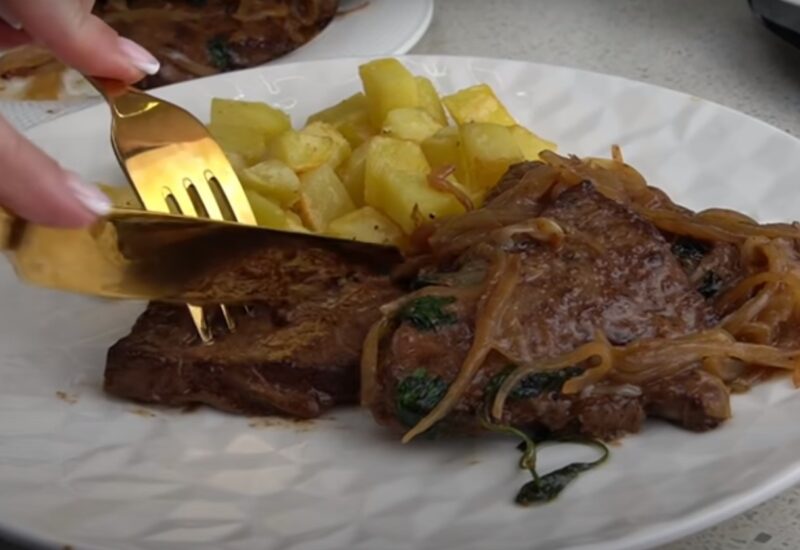Eating liver, a nutrient-dense organ meat has been a practice in various cultures for centuries.
Its reputation as a powerhouse of vitamins and minerals is well-known, but the question arises: “Can You Eat Raw Liver?”
Today, I will explore the nutritional benefits, potential health risks, and various perspectives surrounding the consumption of raw liver.
If You’re In a Hurry…

Nutritional Benefits and Risks associated with raw liver consumption:
| Aspect | Benefit | Risk |
| Nutritional Content | High in vitamins (A, B12, D), minerals (iron, folate) | Overconsumption can lead to vitamin A and copper toxicity |
| Texture & Taste | – | Jelly-like, bitter |
| Health | Supports fertility, vision, muscle building, immune system | Risk of bacterial contamination (Campylobacter, Salmonella, E. coli) |
| Source | Grass-fed liver contains more phytonutrients | Quality varies; grain-fed liver is less nutritious |
| Alternatives | – | Cooked liver, desiccated liver supplements provide similar benefits without risks |
Nutritional Profile of Raw Liver
Essential Vitamins and Minerals
Raw liver is a rich source of essential nutrients. It contains significant amounts of heme iron, which is easily absorbed by the body, making it beneficial for those with iron deficiency.
The presence of folate and vitamin B12 in the liver supports red blood cell formation and neurological function.
Fat-soluble vitamins like D and A are abundant in the liver, contributing to vision, immune system health, and bone maintenance. However, eating this food raw is much different than eating raw greens such as green beans.
Texture and Taste
The texture of raw liver is jelly-like, which might be off-putting for some.
Its taste is described as bitter, yet this organ meat is incredibly rich in B vitamins and vitamin A, essential for various body functions.
Health Risks and Considerations
Potential Bacterial Contamination
Raw liver consumption carries the risk of bacterial contamination.
Pathogens such as Campylobacter, Salmonella, and E. coli can be present, posing a significant risk of foodborne illnesses.
These bacteria can cause symptoms ranging from mild gastrointestinal distress to severe health complications.
Freezing and Food Poisoning Risks
While freezing meat is a common practice to kill parasites and bacteria, it’s important to note that this method may not be effective in eliminating all bacteria in raw liver.
Hence, there remains a risk of food poisoning.
Quality of Liver
The source of the liver plays a crucial role in its nutritional value.
Grass-fed variation is generally considered of higher quality compared to grain-fed one, offering more beneficial phytonutrients.
This distinction is important for those considering adding raw liver to their diet.
Health Benefits of Raw Liver Consumption

Dental Health and Trace Minerals
Apart from its rich nutrient profile, raw liver consumption may benefit dental health.
It provides trace minerals essential for growth and development, contributing to overall physical health.
Fertility, Muscle Building, and Immunity
The nutrients found in the raw liver support various body functions.
These include fertility, muscle building, and boosting the immune system.
Its rich vitamin and mineral content make it a beneficial, albeit controversial, dietary addition.
Risks of Overconsumption
Vitamin A and Copper Toxicity
While the liver is nutritious, overconsumption comes with risks. High levels of vitamin A and copper, especially prevalent in the liver, can lead to health issues.
It is recommended to limit liver consumption to less than 100 grams per week to avoid potential toxicity.
Alternatives to Raw Liver

Cooked Liver
For those concerned about the risks associated with raw liver, cooking the liver is a safer alternative.
Cooking kills harmful bacteria and parasites, reducing the risk of foodborne illnesses.
Desiccated Liver Supplements
Desiccated liver supplements offer a convenient and safe way to gain the benefits of the liver without the risks associated with its raw consumption.
These supplements provide similar nutritional benefits in a processed form.
Cultural Perspectives on Eating Raw Liver
Throughout history, various cultures have included raw liver in their diets, valuing it for its rich nutrient content.
In some traditions, raw liver is consumed for its supposed medicinal properties, believed to enhance strength and vitality.
Knowing these cultural practices provides a broader perspective on the global views regarding raw liver consumption.
The Role of Raw Liver in Modern Diets
In contemporary diets, especially those following paleo or carnivore trends, raw liver is sometimes included for its nutrient density.
Proponents argue that consuming liver in its raw state preserves its nutritional integrity.
However, this practice is not widespread and remains controversial due to the associated health risks.
Practical Tips for Including Liver in Your Diet

1.Safe Handling and Preparation
For those who choose to consume raw liver, proper handling and preparation are key.
This includes purchasing fresh, high-quality liver, preferably from grass-fed sources, and maintaining a clean preparation environment.
Quick consumption after purchase and thorough washing are also advised.
2. Serving Suggestions for Palatability
To counteract the bitter taste and jelly-like texture of raw liver, it can be prepared in various ways.
Marinating in acidic solutions like lemon juice or vinegar not only enhances the flavor but may also aid in reducing bacterial content.
Slicing it thinly and combining it with other flavorful ingredients can also improve its palatability.
3. Recommended Consumption Frequency
Given the risks of vitamin A and copper toxicity, it is advised to consume liver, raw or cooked, in moderation.
The general recommendation of less than 100 grams per week serves as a guideline for safe consumption, ensuring the benefits are reaped without overexposure to certain nutrients.
Final Recommendations
Making an Informed Decision
The decision to eat raw liver should be based on a thorough understanding of its benefits and risks.
It’s a nutrient powerhouse, but not without its dangers. Each individual’s health status, dietary needs, and risk tolerance should guide this choice.
Consulting Healthcare Providers
Before incorporating raw liver into a diet, particularly for specific health conditions, consulting with a healthcare provider is essential.
They can provide personalized advice based on individual health needs and dietary restrictions.
Exploring Alternatives
For those hesitant about raw liver, exploring alternatives like cooked liver or liver supplements is a viable option. These provide similar nutritional benefits without the associated risks of raw consumption.
FAQs
Can I eat raw liver if I’m pregnant?
It is generally advised for pregnant women to avoid it due to the risk of bacterial contamination and high vitamin A levels, which can be harmful to the fetus.
Does the type of animal affect the safety of eating its liver raw?
Yes, the type of animal can affect safety. For instance, livers from certain wild game may carry more parasites compared to domesticated animals.
However, risks of bacterial contamination are present in all types.
Can freezing the liver kill all harmful bacteria and parasites?
Freezing can reduce but not completely eliminate all harmful bacteria and parasites.
Some pathogens can survive freezing temperatures.
Is there a difference in nutrient content between beef liver and chicken one?
Yes, there are differences. The beef variation generally has higher levels of certain nutrients like vitamin A and iron, while the chicken variation is a lighter alternative with a different nutrient profile.
Can eating raw liver affect medication absorption or effectiveness?
Yes, the high vitamin and mineral content in the liver, particularly vitamin A and iron, can interact with certain medications, potentially affecting absorption and effectiveness.
Are there any specific diseases or conditions that are contraindicated for eating raw liver?
Individuals with conditions like hemochromatosis (excess iron absorption) or vitamin A toxicity should avoid eating raw liver due to its high iron and vitamin A content.
Additionally, those with compromised immune systems should avoid it due to the risk of bacterial contamination.
Summary
While raw liver is a nutrient-rich food, its consumption comes with notable risks. It’s crucial to weigh these risks against the potential health benefits.
For those looking to include liver in their diet, considering safer alternatives like cooked or desiccated liver supplements is advisable.
As with any dietary change, it’s recommended to consult with a healthcare provider, especially for those with existing health conditions or dietary restrictions.






